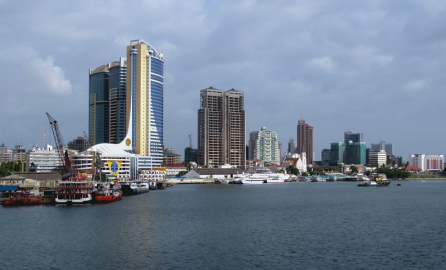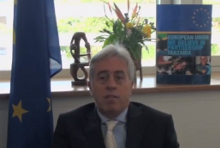The relationship between the European Union (EU) and Tanzania dates back over nearly forty years. The Delegation was opened in Dar Es Salaam in 1976 after the United Kingdom´s accession to the European Community paved the way for the extension of the Europe-Africa cooperation to the Commonwealth countries. Head of the EU Delegation to Tanzania, Mr. Filiberto Ceriani Sebregondi, shares his views on the current priorities of the EU Tanzania cooperation.
Filiberto Ceriani Sebregondi has been Ambassador of the European Union to Tanzania since December 2011, and formerly was Head of the EU Delegation to Ghana. In a recent meeting with DEVCO Information Correspondent, Sarah Douik, Mr Sebregondi shared his insights on the evolving priorities in Tanzania.
Political Priorities
“Our priorities for Tanzania are clearly related to the role that Tanzania has in the sub region of Eastern and Southern Africa, because Tanzania is a country that has experienced a long record of peace and stability and can have a positive effect on the stabilisation of the region. Therefore we support whatever position and engagement Tanzania takes to stabilise existing or potential conflicts like in the Great Lakes Region, in the Horn of Africa or even inside Tanzania.
“Secondly, we support Tanzania as a ‘model’ country for the consolidation of democracy and respect of human rights and the rule of law. Indeed Tanzania is one of the virtuous countries in Africa having a good record in these terms.
“Thirdly, we consider the role of Tanzania on some specific aspects of the fight against illegal traffic, piracy and terrorism. In the Indian Ocean there is piracy emanating mostly from Somalia. The EU has a comprehensive approach to the issues of the Horn of Africa and a comprehensive action against piracy, in which Tanzania is part. We have negotiated, for instance, a pirate transfer agreement with Tanzania and we are offering Tanzania support in the area of capacity building for maritime security.
Development Cooperation
“Under the Cotonou Partnership agreement, and the funds coming from the European Development Fund, we have a long-term established cooperation with Tanzania. At present we have a country programme of about €100 million per year; for the period 2007-2013 the envelope was nearly over 600 million.
“We focus particularly on three areas: Budget Support, which is support to the country Strategy for poverty reduction. By providing resources to the treasury and the national budget we support the priorities of the country, be it in poverty reduction, improvement of service delivery, health, education, transport and so on.
“The second area is Transport and Infrastructure, and here the EU also has a long-standing tradition of cooperation with Tanzania. We have provided support mainly for the rehabilitation of trunk roads and, more recently, of rural roads. With Infrastructure we have also supported water supply, especially for a number of secondary cities, and we have also supported actions in the area of the preservation of natural resources.
“Our third priority area is Agriculture and Regional Integration. I mix the two because in the past we have supported the agricultural sector more on the productive angle, but recently more on the competitiveness side. We try to support agricultural farmers and, in particular, some key crop chains including tea and coffee, to be more competitive and capable to trade within the country, within the region and with the outside world.
“Then we have cross-cutting priorities. We support actions in defence of human rights, in defence of gender parity and gender promotion, and actions in the agenda of climatic change adaptation –the effects of climate change have hit Tanzania hard.
Concrete results
“Over the past ten years, Tanzania has had a 7% economic growth rate and this has been the result of many efforts by Tanzanians themselves, by the policies that have been put in place, but certainly also by the support provided by donors, particularly in the form of Budget Support. The EU, including all the Member States, covers more than 60% of the Budget Support provided to Tanzania – which covers about 30% of the national budget. Therefore we consider that the results achieved in terms of economic growth have been substantial, and certainly the contribution of international assistance has been great, including ours.
“We must also recognize that the results in economic growth have not translated entirely in terms of poverty reduction. For instance, some of the Millennium Development Goals related to Health and Education will be achieved, or are close to being achieved, but others related to Maternal and Infant Health are lagging behind. This is an emergency for the country and we have to devise, together with our partners, how to multiply the effects - on employment, on the welfare of the people - of this economic growth.
“Through our Budget Support and some support in the Health sector we have also contributed to the improvement of the level of coverage of health services.
“We have made a big contribution to the transport sector. This has certainly been beneficial in terms of increasing the traffic, the circulation of goods and people and also we noticed a positive effect on the marketing of agricultural products.
“This couples well with our intervention for instance in the coffee and tea sectors because our support to the coffee sector has been beneficial to some 400,000 smallholders and crop farmers. We have indeed supported the creation of ten drought and disease resistant varieties of tea.
Capacity Development
“One of my immediate experiences when I arrived in Tanzania was dealing with heavy flooding in Dar Es Salaam. I was quickly in contact with the Prime Minister’s office and the emergency mechanism of Tanzania, with ECHO [DG Humanitarian Aid and Civil Protection] and their office in Nairobi, and with the other international partners. We helped with the first reaction to this calamity.
“I observed that in a country like Tanzania there is still quite a lot to do in terms of disaster preparedness and capacity building for reaction to disasters. There have been two other catastrophes, when ferries linking the mainland to Zanzibar have sunk with a high number of casualties. This has raised much concern with the level of safety of maritime transportation.
“We are engaging with the Government both on raising their level of responsibility in adhering to regulations to avoid incidents of this kind, but also in looking at how we can help them in strengthening their preparedness and rescue capacity.”
This collaborative piece was drafted with input from Filiberto Ceriani Sebregondi and Sarah Douik, with support from the capacity4dev.eu Coordination Team.



Log in with your EU Login account to post or comment on the platform.